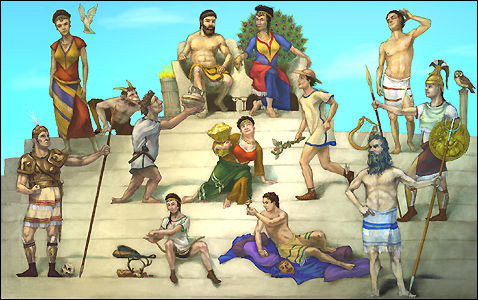

Many of the earliest civilizations believed in polytheism and had a god to represent almost every part of their lives and the products provided to them by the land and earth around them. Where the greek and roman empire were more centered around culture and all the emotions and actions of life through there gods, I.E Apollo-god of music, healing, plague, prophecies, poetry, and archery; associated with light, truth and the sun, Ares- The god of war, bloodlust, violence, manly courage, and civil order, son of Zeus and Hera. Egypt was more focused on the calendar and the movement of time, shifting of seasons and there gods reflect accordingly. Egyptians believed in gods that were representative to their leaders as well as leaders of which protected and nourished there society. The most well-known would be that of Horus, the hawk headed individual who was held as the keeper and protector of Egypt, the Pharaoh/ Queen at the time was known as “The living Horus.” As far as Greece goes, there is a more mythological story line behind each god and the remnants of the gods still exists today in regular society in the media. The forever famous “Hercules” the 1997 production by Pixar inc. was a animated film that up roared the box office telling an animated version of the story of Hercules, the son Of Zeus(god of the gods) and Hera( goddess of childbirth and marriage, who was married to zues in strife and courted unsuccessfully). Besides all the factoids when we get down to the specifics, we have two societies here- Egyptians and Greeks, both polytheistic, but with gods based on totally different reasoning. The greeks were based more on culture, the gods being the ones who blessed them with their surroundings- Love and Lust, Marriage, Childbirth and so on with a leader of the gods that kept them all organized as a some-what symbol of reason within chaos, if you will. The Egyptians seemed totally dedicated to there “Living Horus” or there leader, Pharaoh or Queen who was seen as a living God to the people. There gods- Amun (there god of the gods, who controlled the chaos and was supreme over all just like Zeus to Greece.), Anubis( Overlooking god of the dead, there watcher), and Horus(protector of the ruler of Egypt). With these gods we see similarities with position, both having a leader of all the gods and also being substantially different with Egypt being more centered toward watching there leader and there people while greeks gods were more focused and based off the world and culture/ moods and personalities of the people.

This observation falls in line with how the Egyptian gods looked nothing like humans, but were very intimidating instead. The Egyptians knew that there was a clear distinction between them and the gods. The Greek gods, on the other hand, resembled humans (although on a grander scale), which allowed the Greek civilization to relate to them. The Egyptians were much more focused on preparing for the After Life, whereas the Greeks were tuned in to the “here and now.” It also seemed as if the Greek life was a little “looser” than Egyptian life. A modern day comparison of the two might be the United States and China. Although polytheistic, like several other cultures, the Egyptian and Greek societies weighed heavily on symbolism. What an interesting comparison between the Egyptian and Greek gods. Thanks for sharing.
ReplyDeleteAngela Brooks – Group 2
OMG SO DUMB!!
DeleteThis was a pretty cool compare and contrast. You through in a lot of informative things too. I've always been interested in the mythology of Greek and Egyptians gods. You gave some pretty good examples while you were describing which gods belonged to whom and what they stood for. You had some material in here that was new to me. When you were talking about Horus, i did not know that he was the most known among the Egyptian civilization because I always saw all the gods as equals. One thing that stands out in this entry are the video that you added. Not many people too the time to figure that out, which drew my eyes to your post and kept me interested. I love the movie Hercules too. So it was kind of funny that you put that little clip in there. Overall, this was a very well done post.
ReplyDeleteis there any more constrasates in greek gods in Egypt gods! those examples were so cool
ReplyDeletetrolololololololololololololololololololololololololololololololololololololololololololololololololololololololololololololololololololololololololololololololololololololololololololololololololololololololololololololololololololololololololololololololololololololololololololololololololololololololololololololololololololololololololololololololololololololololololololololololololololololololololololololololololololololololololololololololololololololololololololololololololololololololololololololololololololololololololololololololololololololololololololololololololololololololololololololololololololololololololololololololololololololololololololololololololololololololololololololololololololololololololololololololololololololololololololololololololololololololololololololololol
ReplyDeletewhat the f**********
Deletesorry for the cussing, but this comment aboce about trololo... is fucked up shit
DeleteHAHAHAHAHAHHAHAHHAHA THIS IS A SCHOOL PROJECT the grammar was shit but i'm far too high to give a damn
ReplyDeletewatch you're profanity
Delete*your
Deletethis aint helpfull
ReplyDeleteneeds more info
ReplyDeletelooks big but its very small.
ReplyDeleteprofanity level ØØØØØ
ReplyDeletelolololollolololollolololollolololollolololollolololollolololollolololollolololollolololollolololollolololollolololollolololollolololollolololollolololollolololollolololollolololollolololollolololollolololollolololollolololollolololollolololollolololollolololollolololollolololollolololollolololollolololollolololollolololollolololollolololollolololollolololollolololollolololollolololollolololollolololollolololollolololollolololollolololollolololollolololollololollolololollolololollolololollolololollolololollolololollololololl
ReplyDeletetrolololololololololololololololololololololololololololololololololololololololololololololololololololololololololololololololololololololololololololololololololololololololololololololololololololololololololololololololololololololololololololololololololololololololololololololololololololololololololololololololololololololololololololololololololololololololololololololololololololololololololololololololololololololololololololololololololololololololololololololololololololololololololololololololololololololololololololololololololololololololololololololololololololololololololololololololololololololololololololololololololololololololololololololololololololololololololololololololololololololololololololololololololololololololololololololololololololololololololololololololol
ReplyDelete